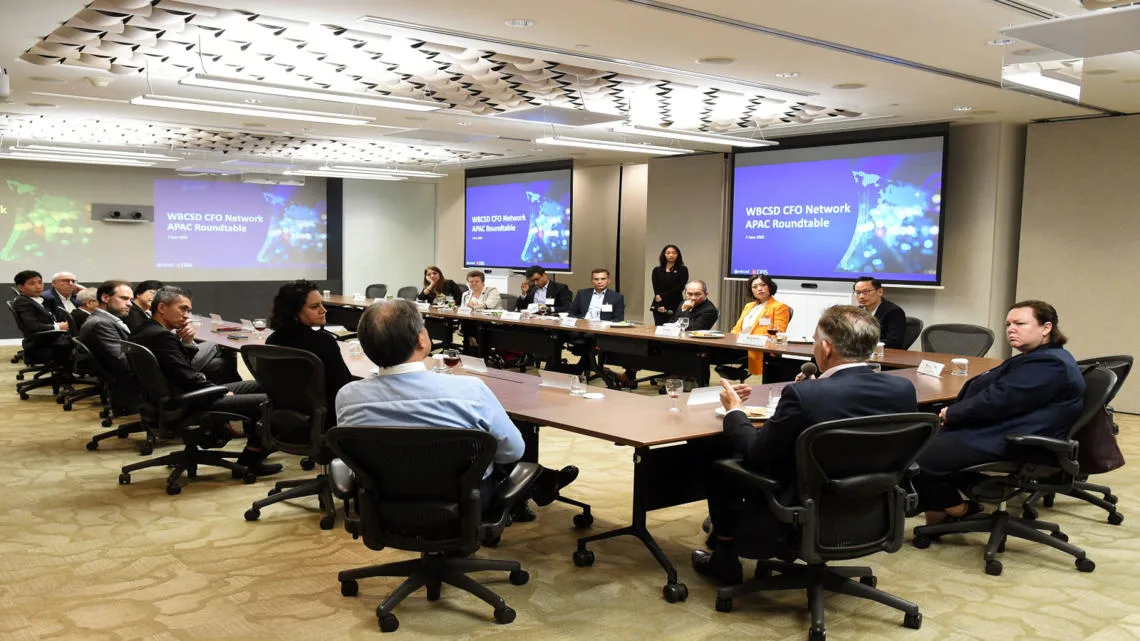Authors
Sok Hui Chng, Group CFO, DBS, Pepijn Rijvers, EVP, WBCSD
Singapore, June 7, 2023 – WBCSD and the CFO Network co-hosted the first in person regional roundtable with CFO Network member, DBS Bank. CFOs and senior leaders from Asia came together to discuss their evolving and critical role in driving business transformation and financing the transition to a net zero, nature positive and equitable economy. In a changing and more conscious investor landscape, these business leaders identified three key opportunities surfacing from challenges they face today: defining metrics by sector; conducting a materiality assessment for long-term corporate value; setting and assessing internal carbon pricing.
The global transition to a low carbon society presents a critical challenge for all businesses. Asia is at the heart of the push towards a global net-zero economy, as it accounts for more than half of global primary energy consumption and greenhouse gas emissions. The region is more vulnerable to the impacts of climate change, including challenges related to deforestation and land conversion. However, Asia is also region rich in biodiversity and holds great potential, giving businesses a great opportunity to show leadership on sustainable business transformations.
Within this context, CFOs play a key role in their company’s response to new mandatory sustainability disclosure requirements. They also serve as a bridge to the investment community and capital markets, unlocking the trillions of dollars in investment needed to accelerate sustainable business transformation.
What are the key takeaways from this CFO-led event?
A changing investor landscape
CFOs see a significant evolution of investor expectations and a growing recognition of sustainability considerations in their investment decision-making:
- Investment performance expectations: Just as several participants echoed that it is possible to “Make money in sustainability”, investors also have a better understanding of the value in balancing short-term financial performance and long-term sustainability impact.
- Increased focus on ESG (Environmental, Social and Governance) integration: Investors recognize that ESG considerations can impact a company’s long-term financial performance and expect companies to integrate ESG factors into their business strategies.
- Credibility and transparency: Investors place greater emphasis on standardized ESG metrics and reporting. They want transparent, consistent and comparable data to assess the sustainability performance of companies. They also want companies to have a credible transition plan to address ESG risks, demonstrate good governance practices and identify opportunities for long-term growth and business viability.
CFO-led business transformation: challenges and opportunities
Current investor trends reflect a shift in mindsets and an orientation towards the long-term view, bringing a new set of challenges for companies to align with ESG integration and performance. CFOs highlighted three key challenges and opportunities they face today:
Challenge: Measurement and reporting frameworks
Participants all agree and recognise that companies face the ongoing challenge of measurement and reporting due the lack of simple, standardised, practical frameworks and metrics. New ESG reporting standards call for clear guidance on ESG acronyms and forums to guide businesses.
Opportunity: Defining metrics by sector
While the ESG reporting landscape is dynamic and continually evolving, businesses should strive to identify and select a few key metrics most relevant for their sector. For example, companies in the same industry could come together and agree to a set of simple, standard, comparable metrics. This would also benefit financial institutions in their assessment of customer’s projects and transition plans.
Challenge: Regional diversity and variability in economic structure
As a region, Asia has significant diversity and variability in terms of economic structures and starting points for a just transition. Balancing the need for energy access, affordability, and reliability with decarbonization efforts poses a complex problem for a growing region of more than 3 billion people.
Opportunity: Conducting a materiality assessment for long-term corporate value
Companies should conduct a materiality assessment to identify sustainability risks and opportunities most relevant to their business and to the climate transition agenda. Understanding material ESG risks can bring incentives such as improved risk management and long-term resiliency of the business, increased access to capital, and potential cost savings. By focusing on what is material, companies can focus on new market growth through innovation, reap the rewards of ‘first mover advantage’ and allocate resources to investments for long-term corporate value.
Challenge: Lack of standardized pricing for carbone
Unlike traditional financial and accounting metrics, there is no clear and standardised pricing mechanism for carbon. Companies are facing the challenge of measuring the financial impact of carbon on their business due to the lack of a single, standard price on carbon.
Opportunity: Setting and assessing internal carbon pricing
Companies could set an internal carbon pricing and perform stress testing and sensitivity analysis to evaluate the resilience of their business models and financial performance under different carbon pricing scenarios. By incorporating an internal carbon pricing into their valuation, companies can demonstrate credibility and commitment in how they have assessed material risks and opportunities, and that they have a long-term view to building a climate resilient and sustainable business.
What’s next?
There was clarity in the roundtable discussion that the voice of the CFO has agency in supporting sustainable business transformation. Showing up actively and contributing brings value with a high return on investment towards essential system change for a better future. There is also a clear need for ecosystem play across government, regulators, private and financial sectors to make this possible.
WBCSD’s Redefining Value and CFO Network is driving action to improve strategic decision-making and business transformation, to create a financial system that rewards the most sustainable companies.
The CFO Network will be hosting more CFO Roundtables this year. If you are interested in learning more, please contact Catherine Puga puga@wbcsd.org.
If you are interested to learn more and receive updates on the topic, sign up to the Redefining Value newsletter!
Outline
